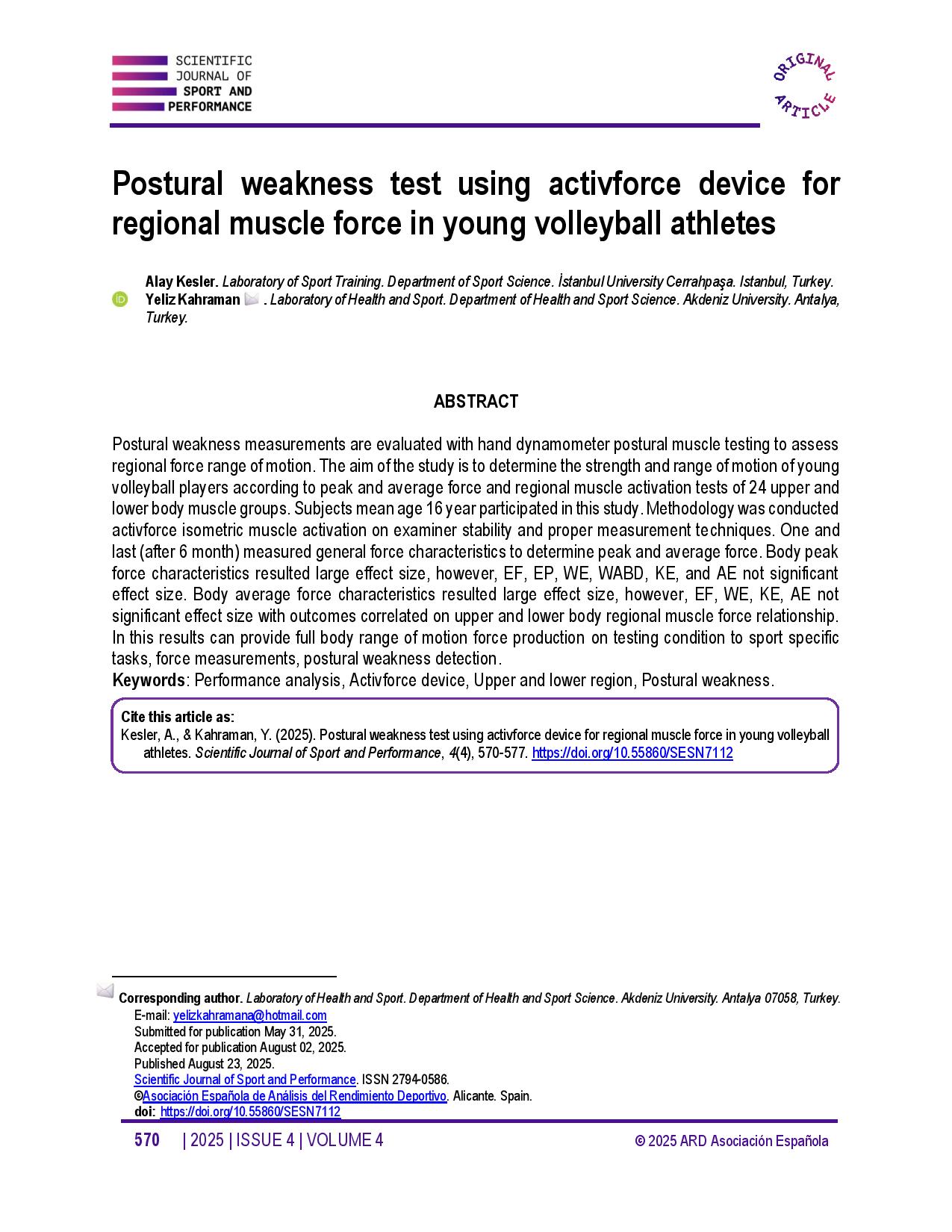Postural weakness test using activforce device for regional muscle force in young volleyball athletes
Main Article Content
Abstract
Postural weakness measurements are evaluated with hand dynamometer postural muscle testing to assess regional force range of motion. The aim of the study is to determine the strength and range of motion of young volleyball players according to peak and average force and regional muscle activation tests of 24 upper and lower body muscle groups. Subjects mean age 16 year participated in this study. Methodology was conducted activforce isometric muscle activation on examiner stability and proper measurement techniques. One and last (after 6 month) measured general force characteristics to determine peak and average force. Body peak force characteristics resulted large effect size, however, EF, EP, WE, WABD, KE, and AE not significant effect size. Body average force characteristics resulted large effect size, however, EF, WE, KE, AE not significant effect size with outcomes correlated on upper and lower body regional muscle force relationship. In this results can provide full body range of motion force production on testing condition to sport specific tasks, force measurements, postural weakness detection.
Article Details

This work is licensed under a Creative Commons Attribution-NonCommercial-ShareAlike 4.0 International License.
References
Andrews, A. W., Thomas, M. W., & Bohannon, R. W. (1996). Normative values for isometric muscle force measurements obtained with hand-held dynamometers. Physical therapy, 76(3), 248-259. https://doi.org/10.1093/ptj/76.3.248 DOI: https://doi.org/10.1093/ptj/76.3.248
Cohen, J. (1988). Statistical power analysis for the behavioral sciences (2nd ed.). Hillsdale, NJ: Erlbaum.
Conroy et al. (2005). Kendall's Muscles Testing and Function with Posture and Pain. Wolters Kluwer.
Kahraman Y. (2021). Postür Kas İskelet ve Mekanik Sendromlar ile İlgili İnsan Hareket Fizyolojisi: Kas İskelet Remodellemesi Geleneksel Derleme. Turk J Osteoporos 27(1): 61-67.
Kahraman, Y. (2024). A new hand dynamometer activforce isometric muscle activation on single joint muscle force of volleyball players. Health Promotion & Physical Activity, 25(4), 22-30. https://doi.org/10.55225/hppa.548 DOI: https://doi.org/10.55225/hppa.548
Kahraman, Y., & Kesler, A. (2025). Reliability and various of isometric force production on regional upper body arm musclejoint complex. Scientific Journal of Sport and Performance, 4(2), 222-228. https://doi.org/10.55860/NBAM4492 DOI: https://doi.org/10.55860/NBAM4492
Karagiannopoulos C, Griech S, Leggin B. (2022). Reliability and Validity of the ActivForce Digital Dynamometer in Assessing Shoulder Muscle Force across Different User Experience Levels. IJSPT, 17(4):669-676. https://doi.org/10.26603/001c.35577 DOI: https://doi.org/10.26603/001c.35577
Kendall H. O, Kendall F. P, Boynton D. A. (1952). Posture and Pain. Baltimore: Williams & Wilkins.
Kendall, F.P. (2005). Muscles Testing and Function With Posture and Pain. 5th edition, Philadelphia, America. Lippincont Williams & Wilkins
O'Connell A, Gardner E. (1972). Understanding the scientific basis of human motion. Baltimore: Williams & Wilkins.




